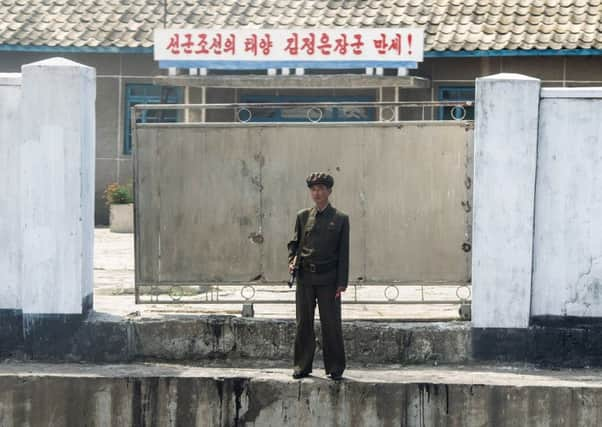Talks end war threat between North and South Korea


In a carefully crafted but vague statement, North Korea expressed “regret” that two South Korean soldiers were maimed in recent land mine blasts Seoul blamed on the North.
While not an acknowledgement of responsibility, let alone the “definite apology” South Korea’s president had demanded, it allows Seoul to claim some measure of victory in holding the North to account.
Advertisement
Hide AdAdvertisement
Hide AdSouth Korea, for its part, halted anti-Pyongyang propaganda broadcasts over loudspeakers on the border, which will let the authoritarian North trumpet to its people a propaganda win over its bitter rival, and silence the broadcasts that outside analysts say could demoralise front-line troops and inspire them to defect.
The agreement represents a good first step in easing animosity that has built since South Korea blamed North Korea for the mine explosion at the border earlier this month and began the propaganda broadcasts in retaliation.
However it is unclear how long the good mood will continue. Despite South Korean president Park Geun-hye’s expression of hope that the North’s “regret” will help improve the Koreas’ relationship, the accord does little to address many fundamental, long-standing differences.
The announcement of further talks to be held soon in either Seoul or Pyongyang could be a beginning, but the Koreas have a history of failing to follow through on their promises and allowing simmering animosity to interrupt diplomacy.
Appearing on North Korea’s official Korean Central TV yesterday, Hwang Pyong-so, who was one of the North’s negotiators, indicated that, despite the expression of regret, Pyongyang had no intention of taking responsibility for the land mine explosions.
Mr Hwang, the top political officer in the Korean People’s Army, said the South learned a “serious lesson” that it should not provoke the North by “creating a groundless incident” that raised tension and increased the possibility of a military clash.
Mr Hwang, however, ended his short TV appearance on a positive note, expressing hope that the accord would provide an opportunity for improved ties.
Pyongyang’s decision to send Hwang to the talks was considered a signal of its seriousness since he is considered to be North Korea’s second most important official after supreme leader Kim Jong-un.
Advertisement
Hide AdAdvertisement
Hide AdThe negotiations that began on Saturday at the border village of Panmunjom, where the Koreas agreed to the 1953 ceasefire in the Korean War, also resulted in Pyongyang agreeing to lift a “quasi-state of war” it declared last week, according to South Korea’s presidential office and North Korea’s state media.